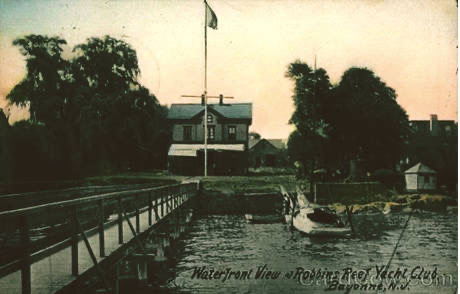
The Commodore woke up in his death dream and looked at it.
He was in Newark Bay where the Passaic was about to make the turn by Staten Island, and he was in a boat.
It was not his boat. That would be too comfortable, and he would not be awake. It was an old-fashioned river boat with a single sail and oars.
He could hear the whisperings in the dream, urging him to let go and let it all drift away.
The Commodore was not a Christian per se. Oh he was born into a Christian family in a desultory sort of way. The church is where you got named, married, and buried. The professionals took care of it for you, but it was really a formality, a window dressing on life’s big occasions.
And that is what the voices in death were on about.
He didn’t live in Christianity, but he did live, and where he lived was here, at the port.
He suddenly grasped that the Club was a break in the afterlife of ambient Christianity and that the Christians had to do all they could to stuff it down and cause it not to be comprehended that there were other options in death, not just an abusive loss of manhood.
Why would a man kneel before a loser who got himself crucified by the real power of the world? Rome with its vast armies that soon became the armies of the Church bearing the standard of a skinny guy who couldn’t defend himself.
Kneeling before Jesus was good for women. The Church is mostly pretty, and that is okay. It is soothing. But it is not how he liked his thoughts.
God can do better than this was the Commodore’s real opinion of the Church, and he realized now that he couldn’t keep himself from scoffing.
That is what he had taken into the afterlife, and that is what they were smothering him for.
At the same time, he decided he respected the women who ran the local Catholic death neighborhood, but he felt in his soul that if they needed to shut him off, then he needed to turn himself ON.
So he resisted the urge to let go and let God, and started rowing.
Suddenly he was on the Hudson by the Port of Bayonne. Above him he saw a skyscraper of shipping containers and many merchant marines of all skin colors looking down. At land level was the 19th century with its Clipper ships that phased in and out of his sight. Indians pulled up in canoes with bales of pelts. He pulled his boat up to a dock that felt like the dock at the Club. A nondescript man was there to toss the docking line to. The man took the line, the Commodore disembarked, and the two of them performed the age-old routine of securing the vessel to the dock. There were the cleats, where they had always been. They pulled her just snug enough not to snap the docking lines, and secured the spring lines enabling the boat to adjust ever so gently to the passing wakes, waves, wind, and the nonstop rocking motion that is ever the fate of vessels in the drink. They put her up nicely, when the Commodore realized that the man was in the brown wool pants of the Irish workingman, with leather shoes, a neckerchief of sorts, and now a hat. Not quite a sailor but not a landlubber, either. He followed the man wordlessly to the office, where he sat opposite him.
“What do I do?”
“Work.”
“Where can I work?”
They both considered the overweightness of the fellow. The Commodore realized that they were demanding that he solve his problems and not gloss over them. The first and most serious problem was his . . . er . . . health.
He felt completely exposed.
Judgement Day was not as he expected — and it hurt.
The man at the desk shook his head sympathetically. He showed him a row of pictures of sailors they had saved from the grinders. They all had sizable jowls.
He seized the chance and said, “I will.”
The man said, through an echo chamber it seemed, “It’s not easy.”
“Show me what to do.”
A lot of visions collided and collapsed. They were in a Navy recruitment office. They were in a colonial outpost. They were in the Rectory of the local Catholic Church. They were in the office at the Club where the Commodore had met his end. He stood there in multiple vision worlds, like the cacaphonous row of televisions at the home electronics store where you don’t know which one to watch.
They went outside.
There was a canoe with bales of pelts that he had to help carry inside for the outpost to evaluate, weigh, and receive pay for. The Indian trader stood in his canoe looking at him like he knew him, knew him in dreams, and that someday the knowledge would come of who they had been and who they were.
He wondered why the bales weren’t in the back of a car.
He tried to to lift a bale and couldn’t.
A child brought a mini-bale over of a few pelts, and the Commodore lifted that and carried it huffing into the office.
An explosion of power ensued as the rough colonial trader took the pelts and handed the Indian a few coppers.
It was disorienting as he first evaporated then reassumed himself.
It wasn’t like anything he had ever felt.
Trade is evidently part of death.
“Business,” intoned the nondescript man.
It was him, but not-him, while also everyone acknowledging the new reality that he was in pelts, loading things, and becoming a man with the muscle mind to survive.
